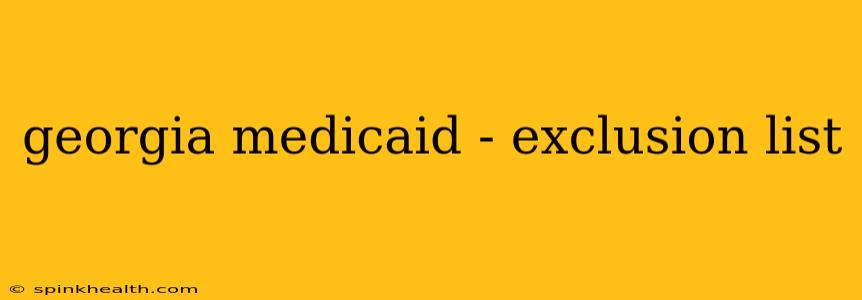The Georgia Medicaid program, a vital lifeline for many, operates under strict guidelines to ensure responsible spending and protect its beneficiaries. A key part of this system is the Georgia Medicaid exclusion list, a registry of individuals and entities prohibited from participating in the program. Understanding this list is crucial for both providers and recipients. This guide unravels the complexities of the Georgia Medicaid exclusion list, answering common questions and providing valuable insights.
My name is Anya Sharma, and I've spent years researching healthcare policy and access. While I can't provide legal advice, this information is based on my research and understanding of publicly available data. Always consult official sources for the most up-to-date and accurate information.
What is the Georgia Medicaid Exclusion List?
The Georgia Medicaid exclusion list is a database maintained by the state, listing individuals and entities—doctors, hospitals, pharmacies, etc.—barred from participating in the Medicaid program. These exclusions stem from various reasons, often involving violations of program rules, fraudulent activities, or criminal convictions related to healthcare. Think of it as a watchlist ensuring accountability and protecting the integrity of the Medicaid system.
Who is Included on the Georgia Medicaid Exclusion List?
The list encompasses a wide range of individuals and entities. This could include:
- Physicians and other healthcare providers: Those found guilty of Medicare or Medicaid fraud, patient abuse, or other serious offenses.
- Healthcare facilities: Hospitals, nursing homes, or clinics that have violated program regulations.
- Pharmacies: Pharmacies involved in illegal drug distribution or fraudulent billing practices.
- Other healthcare professionals: This could range from medical billers to home health aides.
The reasons for exclusion are varied and serious.
How Can I Access the Georgia Medicaid Exclusion List?
Accessing the official Georgia Medicaid exclusion list requires navigating the state's Department of Community Health (DCH) website. The exact location and search functionality may vary, so diligent searching is crucial. Look for sections related to provider enrollment, compliance, or exclusions.
How is Someone Added to the Georgia Medicaid Exclusion List?
Adding someone to the list involves a formal process, often triggered by investigations into suspected violations. This may involve audits, investigations by law enforcement, or complaints filed by patients or other providers. Due process is typically involved, allowing those accused a chance to respond to allegations. The final decision rests with the relevant state authorities.
How Long Does an Exclusion Last?
The duration of an exclusion varies significantly, depending on the severity of the offense and the specific regulations. Some exclusions are temporary, while others are permanent. The length of exclusion is usually clearly outlined in the official notice of exclusion.
Can Someone Be Removed from the Georgia Medicaid Exclusion List?
Removal from the list isn't automatic. An excluded individual or entity typically needs to demonstrate that the reasons for exclusion have been rectified and that they can now comply with all Medicaid regulations. This may involve appeals, rehabilitation programs, or demonstrating a commitment to ethical practices. The process is generally rigorous and may require substantial documentation.
What Happens if a Provider Treats a Medicaid Patient While Excluded?
Treating a Medicaid patient while excluded from the program carries severe consequences. This could lead to further penalties, including additional fines, license revocation, or even criminal charges. It's crucial for providers to verify their status regularly.
This guide aims to provide a comprehensive overview of the Georgia Medicaid exclusion list. Remember, navigating this complex system requires careful attention to detail and consulting with relevant authorities. Always refer to official Georgia Department of Community Health sources for the most current and accurate information.

